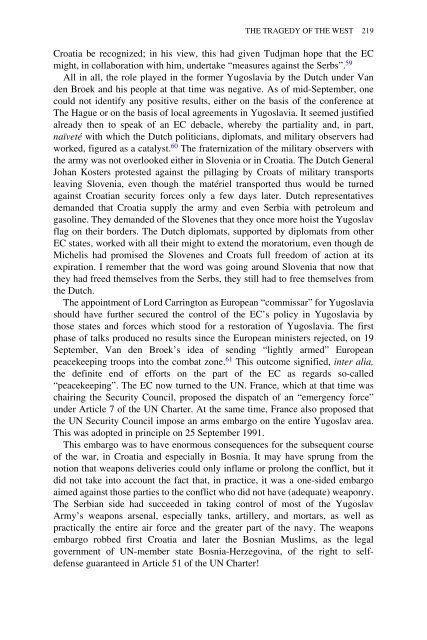Yugoslavia: A History of its Demise - Indymedia
Yugoslavia: A History of its Demise - Indymedia
Yugoslavia: A History of its Demise - Indymedia
Create successful ePaper yourself
Turn your PDF publications into a flip-book with our unique Google optimized e-Paper software.
THE TRAGEDY OF THE WEST 219<br />
Croatia be recognized; in his view, this had given Tudjman hope that the EC<br />
might, in collaboration with him, undertake “measures against the Serbs”. 59<br />
All in all, the role played in the former <strong>Yugoslavia</strong> by the Dutch under Van<br />
den Broek and his people at that time was negative. As <strong>of</strong> mid-September, one<br />
could not identify any positive results, either on the basis <strong>of</strong> the conference at<br />
The Hague or on the basis <strong>of</strong> local agreements in <strong>Yugoslavia</strong>. It seemed justified<br />
already then to speak <strong>of</strong> an EC debacle, whereby the partiality and, in part,<br />
naïveté with which the Dutch politicians, diplomats, and military observers had<br />
worked, figured as a catalyst. 60 The fraternization <strong>of</strong> the military observers with<br />
the army was not overlooked either in Slovenia or in Croatia. The Dutch General<br />
Johan Kosters protested against the pillaging by Croats <strong>of</strong> military transports<br />
leaving Slovenia, even though the matériel transported thus would be turned<br />
against Croatian security forces only a few days later. Dutch representatives<br />
demanded that Croatia supply the army and even Serbia with petroleum and<br />
gasoline. They demanded <strong>of</strong> the Slovenes that they once more hoist the Yugoslav<br />
flag on their borders. The Dutch diplomats, supported by diplomats from other<br />
EC states, worked with all their might to extend the moratorium, even though de<br />
Michelis had promised the Slovenes and Croats full freedom <strong>of</strong> action at <strong>its</strong><br />
expiration. I remember that the word was going around Slovenia that now that<br />
they had freed themselves from the Serbs, they still had to free themselves from<br />
the Dutch.<br />
The appointment <strong>of</strong> Lord Carrington as European “commissar” for <strong>Yugoslavia</strong><br />
should have further secured the control <strong>of</strong> the EC’s policy in <strong>Yugoslavia</strong> by<br />
those states and forces which stood for a restoration <strong>of</strong> <strong>Yugoslavia</strong>. The first<br />
phase <strong>of</strong> talks produced no results since the European ministers rejected, on 19<br />
September, Van den Broek’s idea <strong>of</strong> sending “lightly armed” European<br />
peacekeeping troops into the combat zone. 61 This outcome signified, inter alia,<br />
the definite end <strong>of</strong> efforts on the part <strong>of</strong> the EC as regards so-called<br />
“peacekeeping”. The EC now turned to the UN. France, which at that time was<br />
chairing the Security Council, proposed the dispatch <strong>of</strong> an “emergency force”<br />
under Article 7 <strong>of</strong> the UN Charter. At the same time, France also proposed that<br />
the UN Security Council impose an arms embargo on the entire Yugoslav area.<br />
This was adopted in principle on 25 September 1991.<br />
This embargo was to have enormous consequences for the subsequent course<br />
<strong>of</strong> the war, in Croatia and especially in Bosnia. It may have sprung from the<br />
notion that weapons deliveries could only inflame or prolong the conflict, but it<br />
did not take into account the fact that, in practice, it was a one-sided embargo<br />
aimed against those parties to the conflict who did not have (adequate) weaponry.<br />
The Serbian side had succeeded in taking control <strong>of</strong> most <strong>of</strong> the Yugoslav<br />
Army’s weapons arsenal, especially tanks, artillery, and mortars, as well as<br />
practically the entire air force and the greater part <strong>of</strong> the navy. The weapons<br />
embargo robbed first Croatia and later the Bosnian Muslims, as the legal<br />
government <strong>of</strong> UN-member state Bosnia-Herzegovina, <strong>of</strong> the right to selfdefense<br />
guaranteed in Article 51 <strong>of</strong> the UN Charter!
















